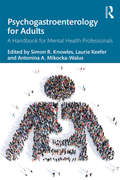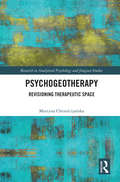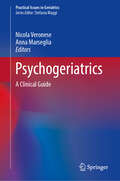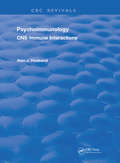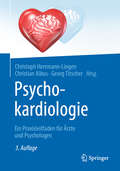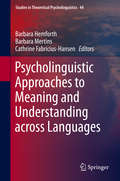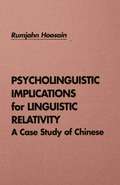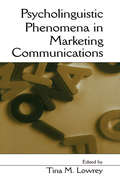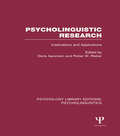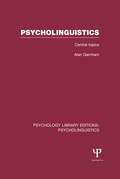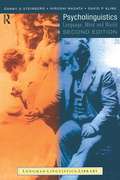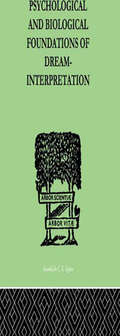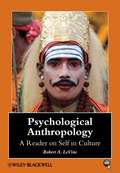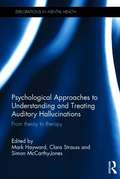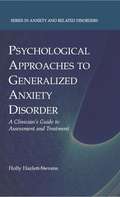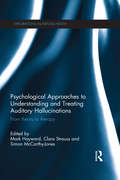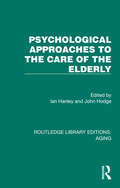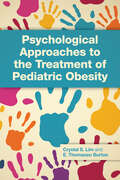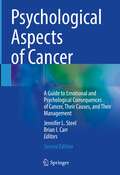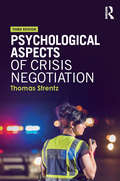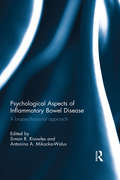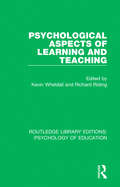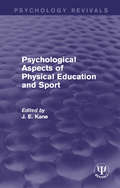- Table View
- List View
Psychogastroenterology for Adults: A Handbook for Mental Health Professionals
by Simon R. Knowles Laurie Keefer Antonina A. Mikocka-WalusThe brain-gut connection has been increasingly implicated in biopsychosocial well-being. While there are numerous factors that directly and indirectly impact on how the gut and the brain interact, there is a growing awareness that gastrointestinal conditions need to be viewed and treated as part of a multidisciplinary approach. Psychogastroenterology for Adults: A Handbook for Mental Health Professionals is the first book to provide mental health professionals with an evidence-based, practical guide for working with patients living with gastrointestinal conditions. Timely and accessibly written, this book provides a unique, comprehensive introduction to psychogastroenterology, offering a step-by-step guide to evidence-based psychological treatment protocols. Broad in scope and expertise, the book is divided into four parts. It opens with an overview of the field, moving on to outline psychological concerns and conditions in gastroenterological (GI) cohorts. Further, it covers various approaches to psychogastroenterology, including psychopharmacological and eHealth practices. In closing, the book looks to the future, providing guidance on supervision in psychogastroenterology, and exploring challenges in the field. Written by experts in the field, this book will be an indispensable resource for those who wish to enhance their knowledge and practice of psychogastroenterology in the mental health profession, including psychologists, psychiatrists, psychosomatic medicine specialists, nurses and social workers.
Psychogeography and Psychology: In and Beyond the Discipline (Concepts for Critical Psychology)
by Alex J. BridgerPsychogeography usually refers to radical and artistic ways of walking or to a conflation of psychology with geography. In this unique work, the author makes arguments for considering psychogeography as a way to critique the contemporary world and to consider new ways of studying the interface of human beings in environments. The book begins by introducing and explaining the term psychogeography from a range of academic, activist, and artistic perspectives. Each chapter presents different approaches to doing psychogeography and there are arguments presented for why there is a need for a postpsychology. The author takes a creative and innovative approach to psychogeography by extending walking methods of research to include other forms of practice and research including playwriting and wargaming. The only book written on psychogeography from a psychological perspective, this book will appeal to researchers and students of psychology, geography, architecture, and cultural studies as well as artists, activists, and the public.
Psychogeotherapy: Revisioning Therapeutic Space (Research in Analytical Psychology and Jungian Studies)
by Martyna ChrześcijańskaPsychogeotherapy offers a critical exploration of the roles played by ideas of space and containment in psychotherapy. Employing approaches from psychogeography with a focus on the praxis of ‘aimless walking’, it explores alternate models of therapeutic space and what the author terms ‘psychogeotherapy’. The book gives a fresh and creative perspective on therapeutic work and its relationship to space, drawing on a range of existing approaches including Freudian, post-Freudian, Jungian and post-Jungian perspectives. With perspectives from various disciplines such as art, social studies, cultural studies and philosophy, the book interrogates the dominant models of containment in psychotherapy and discusses these models from different perspectives to shed new light on classical concepts of therapeutic space and containment in depth psychology and psychotherapy. This book will be of great interest for academics, researchers and post-graduate students in the fields of analytical psychology, psychotherapy, psychogeography and mental health.
Psychogeriatrics: A Clinical Guide (Practical Issues in Geriatrics)
by Nicola Veronese Anna MarsegliaThe book offers a must-have tool primarily for psychiatrists, geriatricians, neurologists, and psychologists, but will also be of interest to general practitioners for first line assessment. The aim of this book is to establish a gold standard: a reference work to be used as a clinical guide to the assessment of mental illness in older persons in the field. Psychogeriatrics is generally a very specific field in the midst of different disciplines, where there is hardly a clinical consensus on how to best assess and treat elderly subjects with mental or behavioral symptoms, possibly resulting from psychiatric disorders. This book provides clear and practical indications, prepared by a panel of international experts in the field with extensive scientific and clinical experience. Boxes with first and second line actions for assessing and treating mental illness in the elderly are included, and all chapters are uniformly divided into sections on epidemiology, etiopathogenesis, differential diagnosis, assessment, and treatment.
Psychoimmunology: CNS Immune Interactions (Routledge Revivals)
by Alan J. HusbandFirst published in 1993, Psychoimmunology: CNS-Immune Interactions is based on papers presented at the Second International Scientific Meeting of the Australian Behavioral Immunology Group, held at the University of Newcastle in Australia on March 7 and 8, 1992. Information featured in the volume confirms the longstanding perception that state of mind and behavioral patterns have an impact on general health. Clinicians discuss correlations between lifestyle, stress, and disease, while scientists reveal their findings on ways in which deliberate manipulations of the central nervous systems and behavioral patterns are reflected in changes in immunological outcome. Other papers present findings regarding the mediators of these interactions, which include cytokines, hormones, and neurotransmitters. Psychoimmunology: CNS-Immune Interactions will be a useful reference for psychoimmunologists, immunologists, psychologists, microbiologists, and all medical and behavioral scientists interested in the links between brain behavior and disease.
Psychokardiologie: Ein Praxisleitfaden für Ärzte und Psychologen
by Christoph Herrmann-Lingen Christian Albus Georg TitscherDie psychosomatische Diagnostik und Therapie hat eine zunehmend wichtige Bedeutung bei der Akutbehandlung, Prävention und Rehabilitation kardiovaskulärer Erkrankungen.Der Zusammenhang zwischen Herzerkrankungen und Psyche sowie den psychosozialen Begleiterscheinungen ist gut belegt. Grundlagen der Kardiologie und psychosomatischen MedizinArzt-Patienten-BeziehungEthische Fragestellungen, Gendereffekte, Psychokardiologie entlang der LebensspannePsychosomatische Problemfelder und KomorbiditätenUrsachen und Folgen: Persönlichkeitsfaktoren, Risikoverhalten, Depression, Angststörungen …Spezifische Diagnostik und Behandlungskonzepte – ambulant und stationärInterdisziplinäre Zusammenarbeit NEU u.a. Collaborative careAkut-Kardiologie, Heart Failure UnitsRehabilitation Entsprechend den deutschen und europäischen Empfehlungen und Leitlinien u.a. DGK Positionspapier zur Bedeutung psychosozialer Faktoren in der KardiologieNationale VersorgungsLeitlinie Chronische KHKESC CVD Prevention in Clinical Practice Geeignet für die Kurse nach den Curricula „Psychokardiologische Grundversorgung“ (D) und „Kardiologische Psychosomatik“ (AU). Zur Vertiefung der entsprechenden Inhalte der Kurse „Psychosomatische Grundversorgung“.Das Buch bietet Kardiologen, Internisten, Allgemeinmedizinern, Psychotherapeuten und Psychologen alle praxisrelevanten Grundlagen, um ihre Patienten bestmöglich behandeln zu können.
Psycholinguistic Approaches to Meaning and Understanding across Languages
by Barbara Hemforth Barbara Mertins Cathrine Fabricius-HansenReports on joint work by researchers from different theoretical and linguistic backgrounds offer new insights on the interaction of linguistic code and context in language production and comprehension. This volume takes a genuinely cross-linguistic approach integrating theoretically well-founded contrastive descriptions with thorough empirical investigations. Authors answer questions on the topic of how we 'encode' complex thoughts into linguistic signals and how we interpret such signals in appropriate ways Chapters combine on- and off-line empirical methods varying from large-scale corpus analyses over acceptability judgements, sentence completion studies and reading time experiments. The authors shed new light on the central questions related to our everyday use of language, especially the problem of how we construe meaning in and through language in general as well as through the means provided by particular languages.
Psycholinguistic Implications for Linguistic Relativity: A Case Study of Chinese
by Rumjahn HoosainRather than offering variations in "world view" as evidence for linguistic relativity, this book views language related differences in terms of the facility with which information is processed. Distinctive perceptual, memory, and neurolinguistic aspects of the Chinese language are discussed, as is the cognitive style of the Chinese people. Chinese orthography and other features of morphology and syntax are examined in relation to both bottom-up and top-down cognitive processes. While providing an extensive review of the experimental literature published in English on the Chinese language, this volume also offers a significant sample of the literature originally published in Chinese.
Psycholinguistic Phenomena in Marketing Communications
by Tina M. LowreyThe field of psycholinguistics and the application of psycholinguistic theory to advertising and marketing communication has become a topic of great prominence in the field of consumer behavior. Psycholinguistic Phenomena in Marketing Communications is the first book to address the growing research in this area. This timely volume combines research conducted by current scholars as it demonstrates diversity of the field in terms of relevant topics and methodological approaches. It examines brand names and their semantic and sound-based impact; sentence structure and research in marketing communication; advertising narratives evoking emotional responses; the effects of empathy response on advertising; and the role of language and images in creation of advertising. The book includes authors from a variety of fields, including mass communication, marketing, social psychology, linguistics, and neuropsychology. A range of perspectives is discussed, from qualitative text analysis to controlled psychological experimentation. Psycholinguistic Phenomena in Marketing Communications is intended for students and scholars in numerous disciplines, such as advertising, marketing, social psychology, sociology, and linguistics. It is also suitable for graduate courses in these disciplines.
Psycholinguistic Research: Implications and Applications (Psychology Library Editions: Psycholinguistics)
by Robert W. Rieber Doris AaronsonOriginally published in 1979, this book represents an effort to bring together the two disciplines at the core of psycholinguistics, psychology and linguistics. It discusses a broad variety of theoretical approaches to psycholinguistics as well as covering a wide range of topics. At the time the book had four goals: to discuss many of the important contemporary issues in psycholinguistics; to explore the different views on major theoretical controversies; to provide an analysis of background literature as a framework in which to evaluate the issues and controversies; and to describe interesting high-quality research currently being done by the authors and some of their colleagues. Today it can be read and enjoyed in its historical context, with many of the chapters still relevant in psycholinguistic research today.
Psycholinguistics: Central Topics
by Alan GarnhamFrom the author: This book reflects my beliefs about how psycholinguistics, and cognitive psychology in general, should be taught. Since psycholinguistics is a scientific discipline, the book discusses theories about the central cognitive aspects of language understanding, rather than presenting a morass of unstructured facts on a series of loosely connected topics. It also attempts to reflect the emergence of cognitive science, an interdisciplinary approach to the study of language and other cognitive processes. It describes not only psychological studies, but also ideas from linguistics, artificial intelligence, the philosophy of language and formal logic. There is no pretence that the discussion is exhaustive.
Psycholinguistics: Central Topics (Psychology Library Editions: Psycholinguistics)
by Alan GarnhamOriginally published in 1985, this title was an important new teaching text at the time. Alan Garnham focuses on current theories about the central cognitive aspects of language understanding, and attempts to reflect the emergence of cognitive science, an inter-disciplinary approach to the study of language and other cognitive processes. As well as describing psychological studies, the text includes ideas from linguistics, artificial intelligence, the philosophy of language and formal logic. Some introductory remarks on the study of language understanding precede a discussion of word recognition and the computation of the syntactic structure of sentences. The central part of the book is concerned with questions about meaning, the mental representation of word meanings, and text comprehension. The final two chapters address questions of how the parts of the language processing system operate together, and how language production is related to comprehension. Rather than attempting an exhaustive discussion of empirical research on his chosen topics, the author gives the reader the flavour of linguistic arguments. In particular, Psycholinguistics attempts to indicate the problems and also the possibilities of relating experimental data to theories of language processing. Psycholinguistics will still be useful reading on courses in psycholinguistics, language and thought, and cognitive psychology.
Psycholinguistics: Language, Mind and World (Longman Linguistics Library)
by Danny D. Steinberg Hiroshi Nagata David P. AlineHow do we learn to produce and comprehend speech? How does language relate to thought?This second edition of the successful text Psycholinguistics- Language, Mind and World considers the psychology of language as it relates to learning, mind and brain as well as various aspects of society and culture. Current issues and research topics are presented in an in-depth manner, although little or no specific knowledge of any topic is presupposed.The book is divided into four main parts: First Language Learning Second Language Learning Language, Mind and Brain Mental Grammar and Language Processing These four sections include chapters covering areas such as- deaf language education, first language acquisition and first language reading, second language acquisition, language teaching and the problems of bilingualism.Updated throughout, this new edition also considers and proposes new theories in psycholinguistics and linguistics, and introduces a new theory of grammar, Natural Grammar, which is the only current grammar that is based on the primacy of the psycholinguistic process of speech comprehension, derives speech production from that process. Written in an accessible and fluent style, Psycholinguistics- Language, Mind and World will be of interest to students, lecturers and researchers from linguistics, psychology, philosophy and second language teaching.
Psychological & Biological Foundations Of Dream-Interpretation (International Library Of Psychology Ser. #Vol. 20)
by Lowy, SamuelFirst Published in 1999. Routledge is an imprint of Taylor & Francis, an informa company.
Psychological Anthropology: A Reader on Self in Culture
by Robert A. LevineDrawing from some of the most significant scholarly work of the 19th and 20th centuries, the Blackwell Anthologies in Social and Cultural Anthropology series offers a comprehensive and unique perspective on the ever-changing field of anthropology. It represents both a collection of classic readers and an exciting challenge to the norms that have shaped this discipline over the past century.
Psychological Approaches To Understanding And Treating Auditory Hallucinations: From Theory To Therapy
by Simon Mccarthy-Jones Mark Hayward Clara StraussThis book draws on clinical research findings from the last three decades to offer a review of current psychological theories and therapeutic approaches to understanding and treating auditory hallucinations, addressing key methodological issues that need to be considered in evaluating interventions. Mark Hayward, Clara Strauss and Simon McCarthy-Jones present a historical narrative on lessons learnt, the evolution of evidence bases, and an agenda for the future. The text also provides a critique of varying therapeutic techniques, enabling practice and treatment decisions to be grounded in a balanced view of differing approaches. Chapters cover topics including: behavioural and coping approaches cognitive models of voice hearing the role of self-esteem and identity acceptance-based and mindfulness approaches interpersonal theory. Psychological Approaches to Understanding and Treating Auditory Hallucinations brings together and evaluates diffuse literature in an accessible and objective manner, making it a valuable resource for clinical researchers and postgraduate students. It will also be of significant interest to academic and clinical psychologists working within the field of psychotic experiences.
Psychological Approaches to Generalized Anxiety Disorder
by Holly Hazlett-StevensConcise, yet without skimping on information, this book reviews current theory and research, addresses important diagnostic issues, and provides salient details in a number of key areas related to GAD. Assessment procedures and treatment planning are covered, along with the latest therapy outcome data, including findings on newer therapies. Also detailed are specific cognitive behavioral therapy techniques, including cognitive strategies, psychoeducation, and anxiety monitoring.
Psychological Approaches to Understanding and Treating Auditory Hallucinations: From theory to therapy (Explorations in Mental Health)
by Mark Hayward Clara Strauss Simon McCarthy-JonesThis book draws on clinical research findings from the last three decades to offer a review of current psychological theories and therapeutic approaches to understanding and treating auditory hallucinations, addressing key methodological issues that need to be considered in evaluating interventions. Mark Hayward, Clara Strauss and Simon McCarthy-Jones present a historical narrative on lessons learnt, the evolution of evidence bases, and an agenda for the future. The text also provides a critique of varying therapeutic techniques, enabling practice and treatment decisions to be grounded in a balanced view of differing approaches. Chapters cover topics including: behavioural and coping approaches cognitive models of voice hearing the role of self-esteem and identity acceptance-based and mindfulness approaches interpersonal theory. Psychological Approaches to Understanding and Treating Auditory Hallucinations brings together and evaluates diffuse literature in an accessible and objective manner, making it a valuable resource for clinical researchers and postgraduate students. It will also be of significant interest to academic and clinical psychologists working within the field of psychotic experiences.
Psychological Approaches to the Care of the Elderly (Routledge Library Editions: Aging)
by John Hodge Ian HanleyOriginally published in 1984, the overall purpose of this book was to provide ideas and suggestions about the usefulness of applied psychology in dealing with some of the problems of the elderly.
Psychological Approaches to the Treatment of Pediatric Obesity
by Dr. Crystal Stack Lim Dr. Elvin Thomaseo BurtonThis book offers a comprehensive review of current research and theoretical approaches to pediatric obesity. Pediatric obesity is a significant public health concern that currently affects 1 in 5 children and adolescents. Prevention and treatment of this complex health condition requires a multifaceted approach that acknowledges the intersecting roles of gender, race and ethnicity, socioeconomic status, and other factors that play key roles in the onset and maintenance of pediatric obesity. Written for mental health clinicians, as well as medical practitioners such as physicians, nurses, dietitians, and exercise physiologists who care for children and adolescents, this helpful resource offers a comprehensive review of current research and theoretical approaches, as well as clear descriptions of effective strategies to prevent and treat pediatric obesity. Through a lens of diversity, equity, and inclusion, the authors incorporate cutting edge research and their extensive clinical experience and expertise as they review evidence-based treatments that can be incorporated into various settings, including primary care, mental health, and specialty medical care clinics as well as schools and community organizations. With a special focus on psychological factors, including mental health conditions that frequently co-occur with pediatric obesity, this book incorporates case examples, treatment guidelines, and reproducible handouts to make addressing pediatric obesity more accessible to clinicians and practitioners.
Psychological Aspects of Cancer: A Guide to Emotional and Psychological Consequences of Cancer, Their Causes, and Their Management
by Brian I. Carr Jennifer L. SteelThis book addresses the unmet needs of the medical community in dealing with the psychological problems, particularly anxiety and depression, of patients diagnosed with cancer. Providing a scholarly review of the impact of cancer diagnosis on patients’ emotional and psychological status, as well as the evidence that psychological factors impact cancer occurrence and biological behavior, this book explores the therapeutic implications of such converse dynamics. Chapters review financial toxicity, eHealth, palliative care, mindfulness, sleep and cancer, social support and cancer, cultural diversity, pediatric and adolescent oncology, and geriatric oncology. While intended primarily for the professional readership of oncologists, psychologists, psychiatrists, social workers, and palliative care physicians, a final chapter also provides practical information on available resources for patients. This fully updated and expanded new edition of Psychological Aspects of Cancer: A Guide to Emotional and Psychological Consequences of Cancer, Their Causes, and Their Management provides practitioners with cutting edge knowledge as well as practical information that translates into better care for patients with cancer.
Psychological Aspects of Crisis Negotiation
by Thomas StrentzPsychological Aspects of Crisis Negotiation, Third Edition, explores the methods and strategies for confronting the nine types of subjects typically encountered in hostage/suicide sieges by correctional staff and law enforcement crisis negotiators. Strentz, an experienced negotiator who designed and directed the FBI’s hostage negotiator program, lays out the critical elements that are required for a successful encounter with a hostage taker or other malfeasant. This book highlights psychological dynamics of negotiations as they apply to the negotiator, the hostage, and the subject. It discusses the predictors of surrender versus the need for a tactical intervention and examines the phases of a hostage crisis and the changing focus as the crisis develops. Referencing historical events such as the Bay of Pigs invasion and the Challenger and Columbia incidents, this text demonstrates how faulty group decision making can spell tragedy. Enhanced with case studies to put the material into context, this third edition also includes new chapters on the SWAT team/crisis negotiator interface and on the genesis of the increased incidence of mentally ill hostage takers. Based on decades of experience in the fi eld and practical advice from a national expert, this volume arms negotiators with the knowledge and tools they need to defuse crises and increase the odds that hostages will survive.
Psychological Aspects of Inflammatory Bowel Disease: A biopsychosocial approach
by Simon R. Knowles Antonina A. Mikocka-WalusIn the Western world around 360 in every 100,000 individuals have inflammatory bowel disease (IBD), a relapsing-remitting autoimmune disease that affects the gastrointestinal tract. Its impact on individual functioning across physical and psychosocial domains is significant and psychological distress is a common feature, with research suggesting that active IBD is associated with one of the highest rates of depression and anxiety of all chronic illnesses. Despite the high prevalence of mental health co-morbidities in IBD, psychological illness remains largely undertreated, with studies showing that 60% of IBD patients experiencing mental health problems do not receive adequate help. In this book, Knowles and Mikocka-Walus bring together world experts who practice integrated and holistic approach in their care for IBD patients, to provide an overview of research across a range of topics associated with the biopsychosocial treatment of IBD. Each chapter provides an up-to-date comprehensive consolidation and evaluation of the current literature alongside recommendations for practice. Key themes include: current understanding of the interrelationship of the neurological and biological aspects of IBD common concerns and issues individuals with IBD face exploring challenges across individual life-stages current evidence for psychosocial interventions recommendations for future directions of biopsychosocial work. Psychological Aspects of Inflammatory Bowel Disease: A biopsychosocial approach is a key resource for researchers, practitioners and academics considering psychosocial aspects of the disease and psychological interventions. It will also appeal to health psychologists and mental health practitioners working with clients with IBD, as well as gastroenterologists interested in a comprehensive and holistic approach to IBD management.
Psychological Aspects of Learning and Teaching (Routledge Library Editions: Psychology of Education)
by Richard Riding Kevin WheldallEducational psychology has much to offer teachers and trainee teachers which can be of help to them in their work. In this book, originally published in 1983, leading experts look at a number of important topics in educational psychology. The chapters present detailed overviews of these key issues, survey recent research findings and advances in the subject at the time, and discuss innovative techniques and approaches which are particularly relevant for classroom practice. This book, much needed at the time, will still be extremely useful to mature teachers and to all students of educational psychology.
Psychological Aspects of Physical Education and Sport (Psychology Revivals)
by J. E. KanePsychology has an important part to play in the teaching and practice of physical education and sport, and this volume, originally published in 1972, provided a systematic and authoritative introduction to the major areas in this field at the time. The contributors, leading experts in the UK and US, cover five major areas of psychology: perception, learning, personality, motivation and emotion, focusing attention on important current research of the time, and opening up these areas for the serious student. They review controversial issues of central importance in physical education and sport, pointing to practical implications for learning, teaching and coaching. A great opportunity to read an early take on what has become a central part of physical education and sport today.
